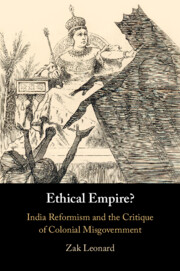Book contents
- Ethical Empire?
- Ethical Empire?
- Copyright page
- Contents
- Figures and Table
- Preface and Acknowledgments
- Association Abbreviations and Key Membership
- Introduction
- 1 The Origins of Reform
- 2 “A Blot on English Justice”
- 3 Public Works, Publicity, and the Search for a New State-Idea
- 4 Reformist Collaboration and the Formation of an Imperial Civil Society
- 5 Anomalous Annexations
- 6 Politicizing Decline
- 7 Radical Reformism and the Challenge of Capitalist Complacency
- Epilogue: Integrating the Empire
- Bibliography
- Index
3 - Public Works, Publicity, and the Search for a New State-Idea
Published online by Cambridge University Press: 05 October 2023
- Ethical Empire?
- Ethical Empire?
- Copyright page
- Contents
- Figures and Table
- Preface and Acknowledgments
- Association Abbreviations and Key Membership
- Introduction
- 1 The Origins of Reform
- 2 “A Blot on English Justice”
- 3 Public Works, Publicity, and the Search for a New State-Idea
- 4 Reformist Collaboration and the Formation of an Imperial Civil Society
- 5 Anomalous Annexations
- 6 Politicizing Decline
- 7 Radical Reformism and the Challenge of Capitalist Complacency
- Epilogue: Integrating the Empire
- Bibliography
- Index
Summary
Reformers chastised the colonial administration for its extractive military-fiscalism and its inability to generate new “state-ideas” as a peacetime power. Public works constructed under native rule had widely fallen into despair; in the Company era, the government rarely expended more than 1 percent of its revenue on their maintenance. In Chapter 3, I argue that reformers considered this parsimony to be an anomalous departure from both pre-colonial and metropolitan precedents. Aligning themselves with Sir Arthur Cotton, a doyen of irrigative canal engineering, they developed a biopolitical state-idea that tasked the colonial state with the preservation of human life. At the same time, they rebuked the colonial bureaucracy for its culture of obfuscation and demanded the establishment of a new “state-system” rooted in transparency.
- Type
- Chapter
- Information
- Ethical Empire?India Reformism and the Critique of Colonial Misgovernment, pp. 92 - 122Publisher: Cambridge University PressPrint publication year: 2023

